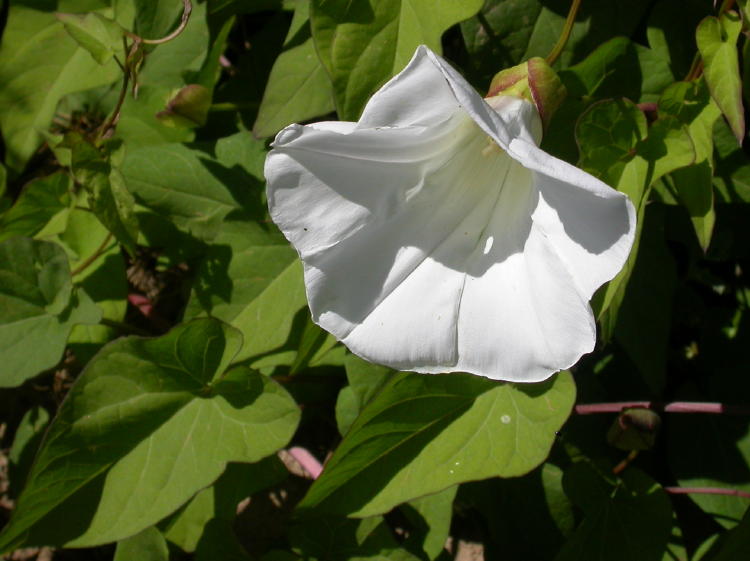Hedge bindweed identification and control
Calystegia sepium or Convolvulus sepium

Hedge bindweed, also called morning glory, is a perennial herbaceous vine that twines around other vegetation or fences for support and has large, white trumpet shaped flowers. Stems are light green to red, slender, twined, branched and mostly hairless. Leaves are sparsely distributed along the stems, 2.5-5 inches long and 1-2 inches wide, roughly arrowhead-shaped with large basal lobes that can be rounded or squared-off in shape. Flowers are composed of white petals that are fused into a flared trumpet shape, about 2-3 inches across and long. Two large green leafy bracts are found at the base of each flower. Below ground the plant has extensive, white fleshy rhizomes and fibrous roots, and it may extend into the ground up to 10 feet. It spreads by clonal offshoots from its rhizomes and by seed. It resembles field bindweed but with larger flowers and leaves. It is a common weed especially in developed areas, farms, urban parks and vacant lands. It is considered an invasive plant in King County and is on the King County Weeds of Concern list. Control is recommended where natural resources are being protected or as part of a stewardship plan. However, this plant is very difficult to eliminate so it may only be possible to suppress it while allowing other plants to establish. Contact the noxious weed program for advice on managing large infestations.
May be confused with
Field bindweed (Convolvulus arvensis) closely resembles hedge bindweed, but its leaves and flowers are smaller and it tends to grow along the ground instead of climbing. It is a very problematic weed in many crops.
Additional information on hedge bindweed
- Bindweed weed alert (Acrobat file).
- Invasive Plant Atlas of the United States (external link)
- Oregon State University article "Vine Weeds" (external link)
- UW Burke Museum Image Collection (external link)
What to do if you find this plant in King County, Washington
Because hedge bindweed is so widespread, property owners in King County are not required to control it and we are not generally tracking infestations. We can provide advice on how to control hedge bindweed, but there is no legal requirement to do so.
Related information
Related agencies
Program offices are located at 201 S. Jackson St., Suite 600, Seattle, WA 98104. To contact staff, see the Noxious Weed Control Program Directory, send an email, or call 206-477-WEED (206-477-9333).

 Translate
Translate